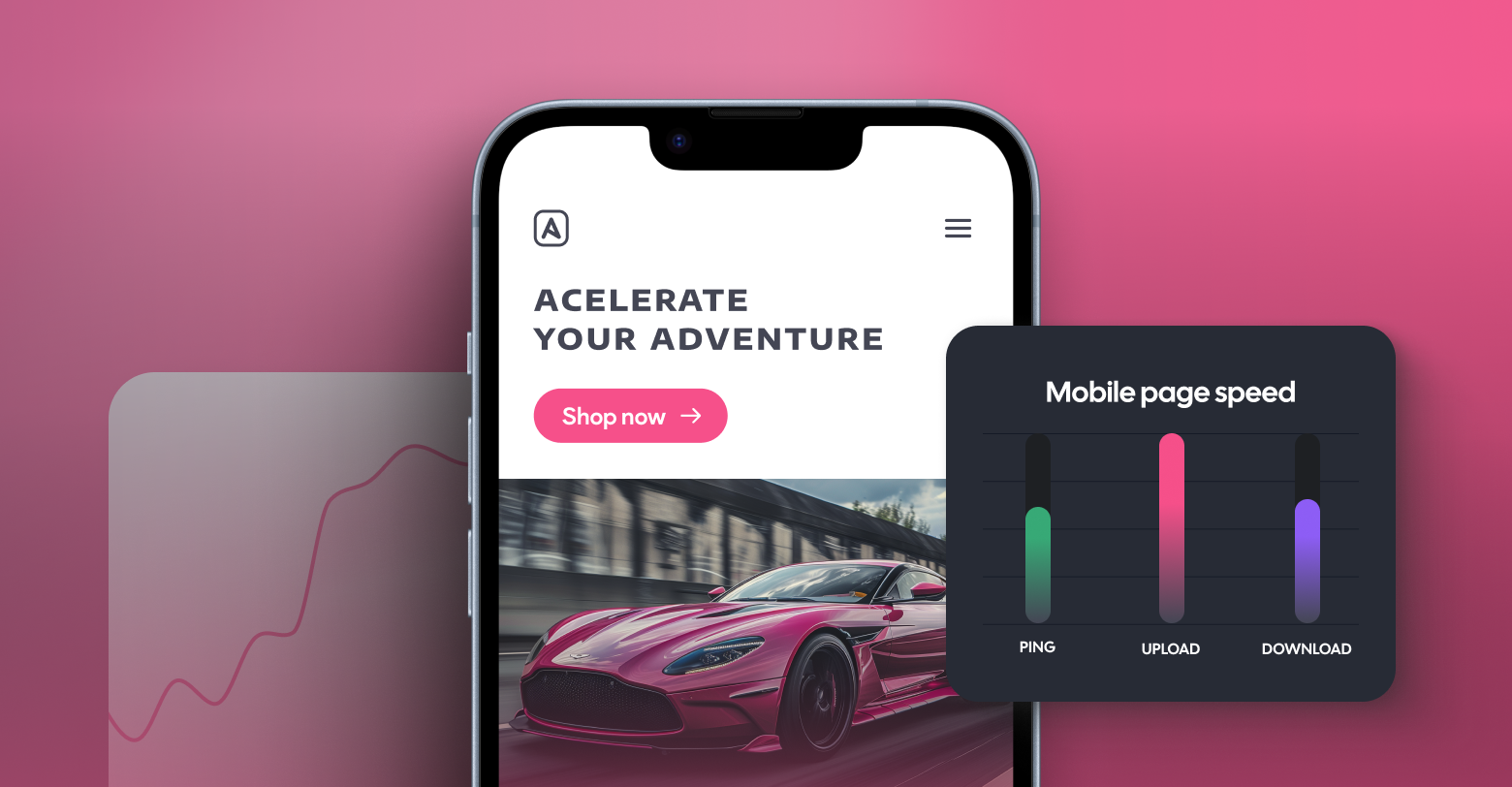Questions about optimizing mobile page speed are common in the web design world. To address these, we turned to
Russ Jeffery, Director of Platform Strategy at Duda and one of our experts on the matter. With his extensive experience and deep knowledge, Russ provides valuable insights into the key factors that impact mobile page speed and how to improve it effectively.
The interview
Since there is so much to cover when it comes to mobile page speed we decided to conduct an interview rather than simply summarizing the topic, asking Russ all the burning questions on that matter that we have extracted from various resources, including
Duda’s community.
Q: Why is everybody talking about mobile page speed and not focusing on desktop page speed? Why is that more important?
Russ:
“Mobile page speed is more critical for several reasons. First, it's generally harder to score well for mobile due to the slower internet and less powerful devices. Second, over 50% of web traffic comes from mobile devices. Third, Google uses the mobile version of a website for indexing and ranking. Although desktop performance still matters, Google's primary focus is on mobile performance.”
Q: Which is the best tool to test mobile speed? Is it PageSpeed Insights or any other tool?
Russ:
“There is no single best tool, but different tools provide different data sets. The Chrome User Experience Report (Crux) offers real-world user performance data, which is ideal. PageSpeed Insights and Lighthouse, on the other hand, simulate environments and provide initial insights but might not reflect real-world performance accurately. Both types of data are useful, but real user data from Crux is more indicative of actual performance.”
Q: Why is there a difference between tools that test mobile speed?
Russ: “PageSpeed Insights and Lighthouse are actually the same tool. Lighthouse can be run locally, while PageSpeed Insights runs it on a server. Differences arise due to fluctuations in the testing environment, such as variations in internet speed, CPU resources, and other factors. These tools give different results because they simulate rather than measure real-world usage.”
Q: What is a good mobile page speed?
Russ: “It's difficult to define a "good" mobile page speed because it depends on various factors. However, a Lighthouse score above 70 is generally considered good. Core Web Vitals is a combination of metrics like Largest Contentful Paint (LCP), First Input Delay (FID), and Cumulative Layout Shift (CLS), and passing these metrics means the site provides a good user experience.”
Q: Can you clarify the difference between mobile page speed and Core Web Vitals?
Russ:
“Mobile page speed is a vague term referring to how fast a website loads on mobile devices. Core Web Vitals, however, is a set of specific metrics (LCP, FID, and CLS) that measure user experience aspects of loading performance, interactivity, and visual stability. While mobile page speed is part of Core Web Vitals, the latter encompasses more comprehensive metrics.”
Q: What is LCP, and what is a good LCP score?
Russ: “Largest Contentful Paint (LCP) measures how quickly the largest element (e.g., image, text block) on the page loads. A good LCP score is under 2.5 seconds.”
Q: Is it possible to have top Core Web Vitals scores but poor mobile page speed?
Russ:
“No, if your Core Web Vitals scores are good, it means your mobile page speed is also optimized. Core Web Vitals include metrics that directly relate to page speed, so poor mobile page speed would prevent passing Core Web Vitals.”
Q: If Duda is the leading website builder in Core Web Vitals scores, does it mean we are top performing in mobile page speed?
Russ: “Yes, because our high Core Web Vitals scores indicate that our sites perform well in terms of mobile page speed and overall user experience.”
Q: What measures has Duda taken to achieve good mobile page speed scores? How is Duda different from other website builders in this regard?
Russ:
“Duda has implemented various optimizations, including prioritizing above-the-fold content, image optimization, lazy loading, server optimization, and font optimization. We've made numerous tweaks to our platform to enhance performance, such as improving cookie banner loading and optimizing font sizes to prevent layout shifts.”
Q: Why does a site performance score change with every test?
Russ: “Fluctuations in site performance scores occur due to variations in internet speed, CPU usage, and other environmental factors during each test.”
Q: Will the site performance improve right after changes are made? How much time does it take to see the impact of the change?
Russ: “Changes should reflect immediately in your performance scores, but it can depend on factors like cache and propagation time.”
Q: How does implementing INP (Interaction to Next Paint) affect the score of mobile site speed?
Russ: “INP is an evolution of the FID metric and is more stringent, often causing a drop in passing rates for Core Web Vitals initially. Websites need to optimize further to meet INP standards.”
Q: How to optimize page speed on mobile? What should I check first?
Russ:
“Start by using tools like PageSpeed Insights or Lighthouse to identify key issues. Focus on critical metrics like LCP, INP, and CLS. Use Chrome DevTools to drill down into specific problems and identify elements causing delays.”
Q: What kind of things should someone remove from the mobile version of their site to significantly contribute to page speed?
Russ:
“Avoid heavy elements above the fold, such as booking widgets or Google Maps. Simplify the above-the-fold content to ensure faster loading times.”
Q: What can an agency tell a client with a low mobile page speed who wants to switch to a different website builder?
Russ: “Explain that most websites perform poorly on these tests, and switching platforms is unlikely to solve the problem. Duda performs better than most platforms, including WordPress. Focus on optimizing their current site rather than switching.”
Q: Have you done any customizations that improve mobile page speed even further?
Russ: “Yes, Duda continuously improves Core Web Vitals through various optimizations, such as better handling of cookie banners, font size calculations, and improvements to specific widgets like photo galleries.”
Q: What would you ask a client before building their website to make sure you've done everything you can to get a good score?
Russ: “Avoid using multiple Google Fonts, heavy elements like background videos, and ensure analytics and tracking tools are used sparingly. Set expectations about not overloading the site with apps that might slow it down.”
Q: Is there anything else you would recommend an agency do to ensure a client site performs well on mobile?
Russ:
“Use Duda. Set appropriate expectations and continuously monitor and optimize the site using the tools and practices discussed.”
Final note
Russ Jeffery's comprehensive overview should help you address the most common questions regarding mobile page speed. By implementing Russ's recommendations, including prioritizing above-the-fold content and optimizing key metrics like LCP and CLS, you can drive measurable improvements in your client’s user experience and site performance. Oh, and as Russ suggests, use Duda - it’s a failproof way to ensure you have the right infrastructure for optimal mobile page speed.
To get a taste of Duda,
try Duda free trial.








